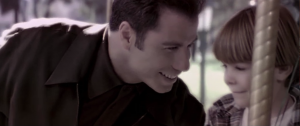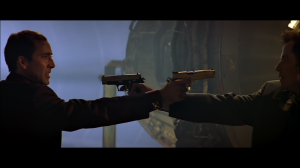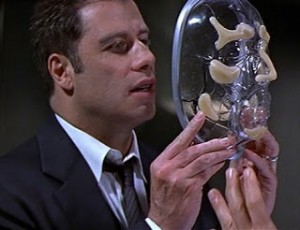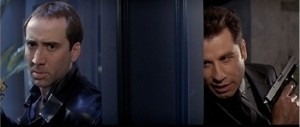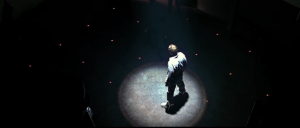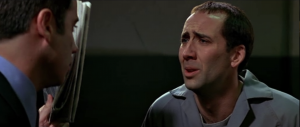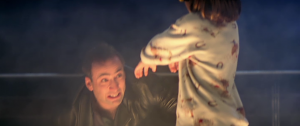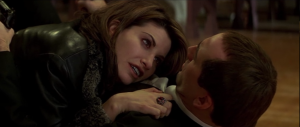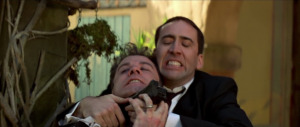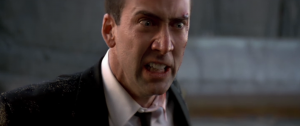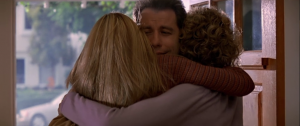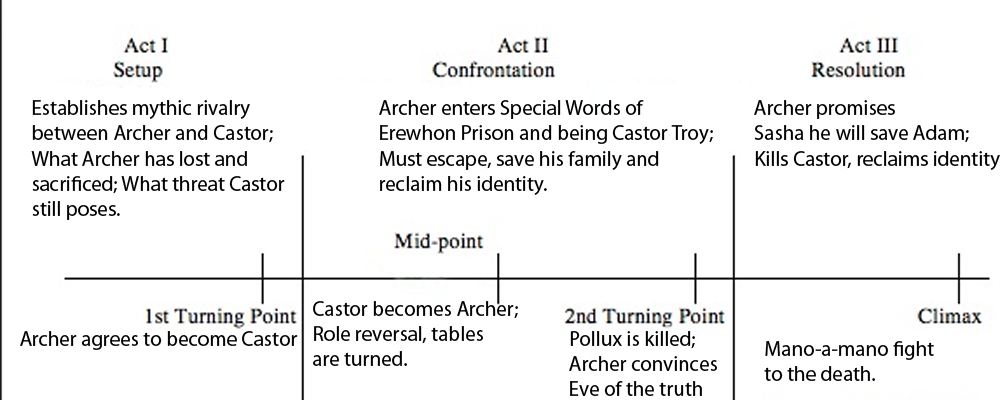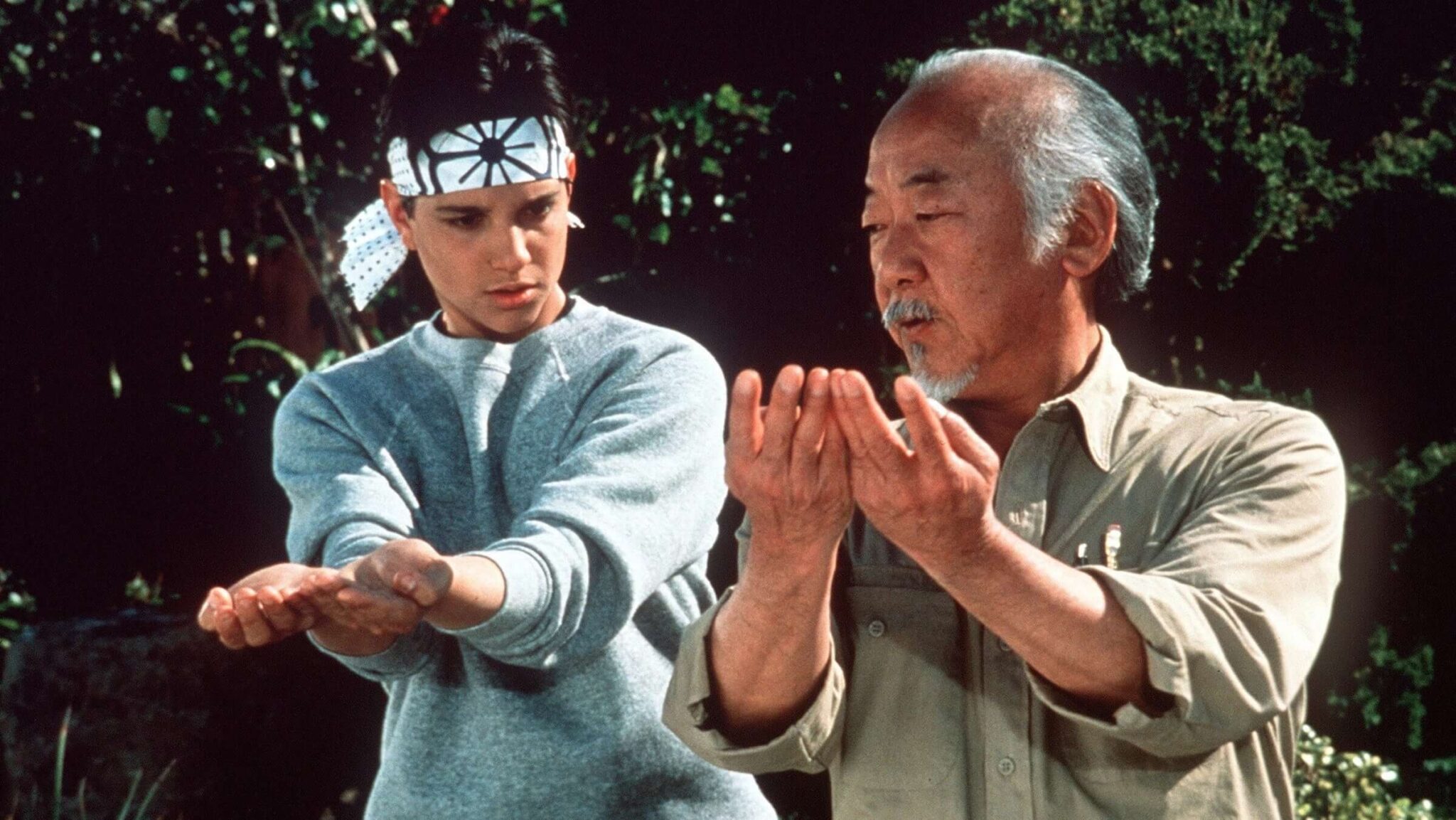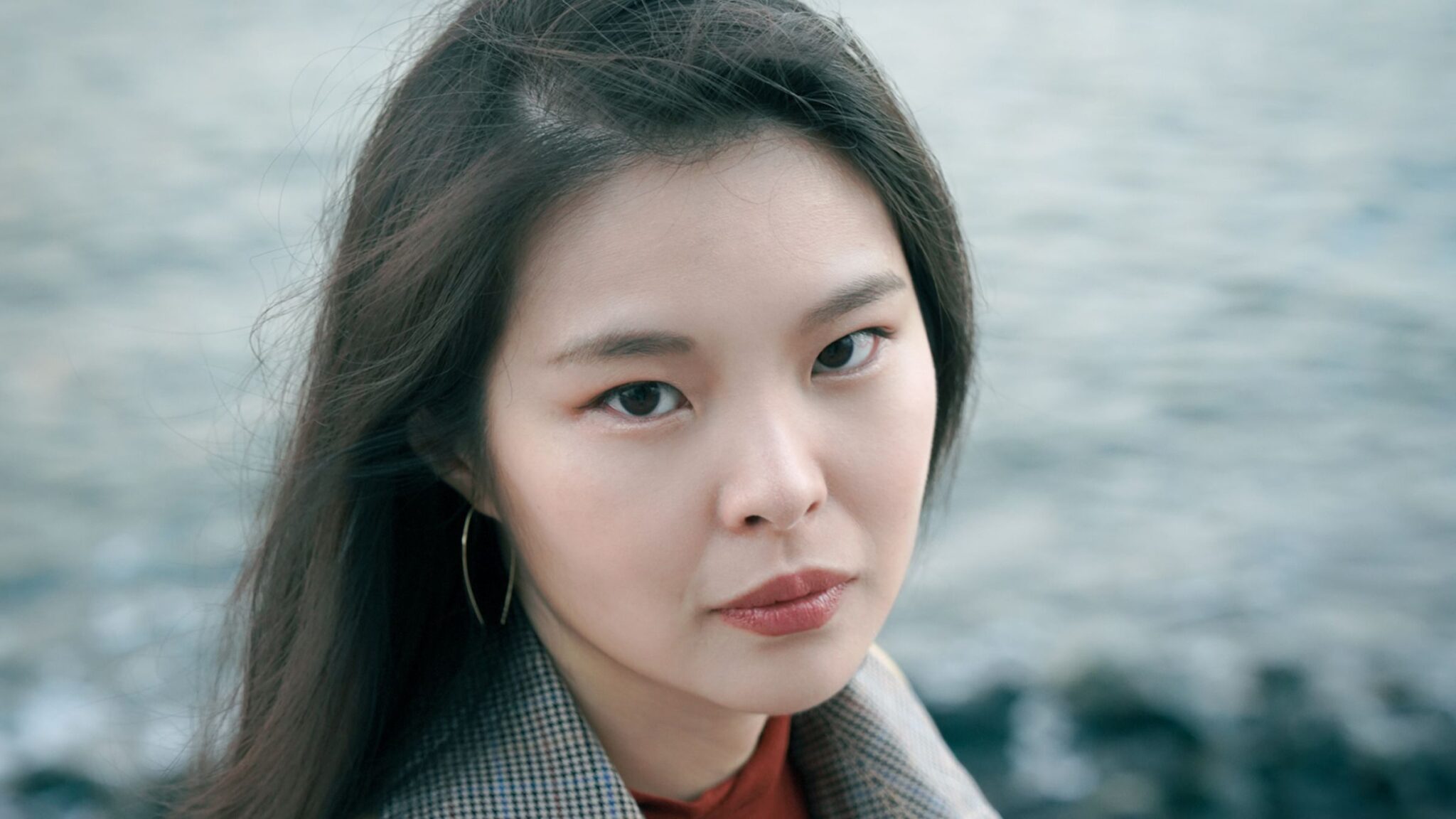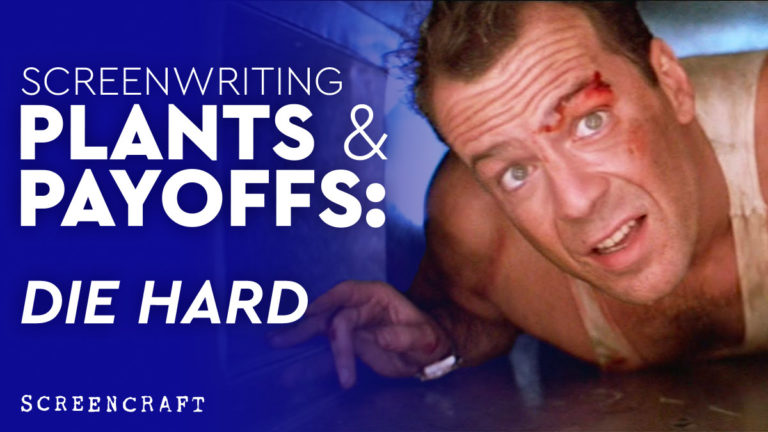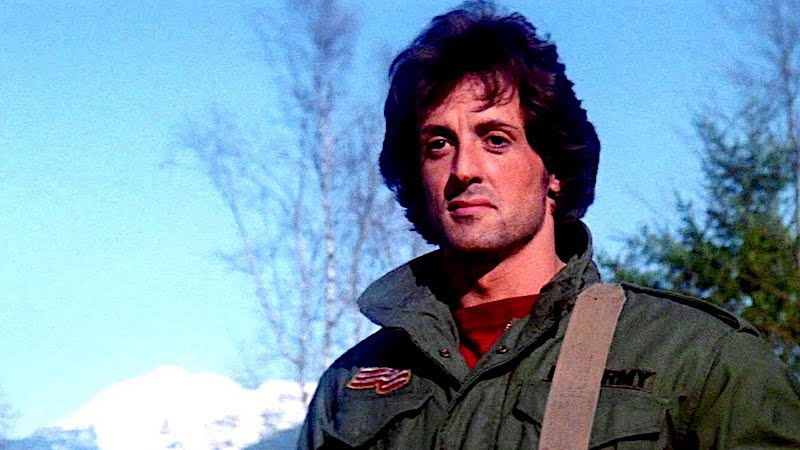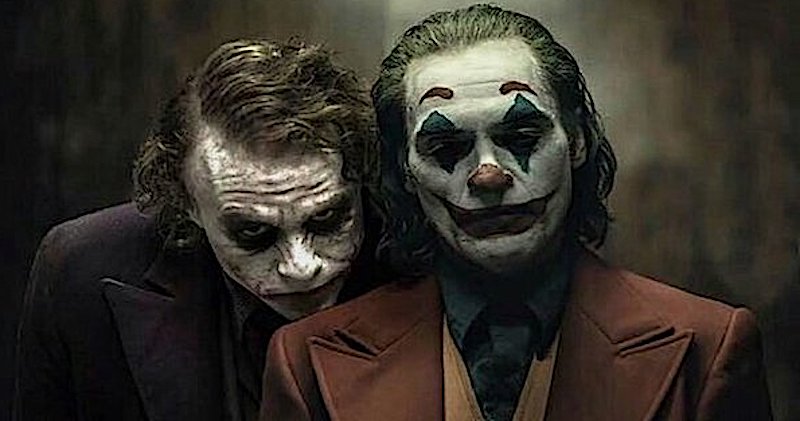
As the deadline for entering our Action Script Contest quickly approaches, for inspiration let’s take a look at Face/Off, a singular, first-rate action script . I referenced Face/Off repeatedly in my rambling take on Escape Plan, but it’s more than worth looking at in its own right.
Personally, I’d rate Face/Off with Die Hard, Lethal Weapon, First Blood, Dirty Harry, In The Line of Fire, The French Connection and Heat as some of the very best American action thrillers of all time. Disagree with me all you want, but those are my crème de la crème. Face/Off is arguably the most conceptually distinctive script of that bunch, and it creates ultra-personal emotional stakes at a peak level that few other action scripts have matched.
Logline: In order to go undercover and find the location of a bomb, an FBI agent undergoes an experimental surgery that gives him the visage of his comatose terrorist nemesis, but the plan backfires when his nemesis wakes up and impersonates him via the same surgery.
Now to be clear, I'm going to be working off Face/Off the film, not the script, because it's the final text, the final rewrite. Links to multiple drafts of the script are provided at the bottom, and seeing the evolution is a fascinating education. Face/Off is one of those rare projects that went through an elaborate and perhaps even torturous development process (it was originally penned as a futuristic sci-fi vehicle for Sylvester Stallone and Arnold Schwarzenegger) and ended up being made with the absolute perfect creative elements.
The conflict between hero and villain in Face/Off is nothing short of epic, and the narrative manages to be incredibly intense, emotionally engaging and wildly entertaining at the same time.
Here’s the first thing I love about Face/Off: you get a full movie in the first twenty minutes. That is to say, the script tells a complete, cathartic story in the first half of Act I; then a crazy, unexpected sequel ensues for the next two hours. In Face/Off, you get two movies for the price of one.
Act I
In the gut-wrenching opening, FBI agent Sean Archer's (Jon Archer in the script) young son Michael (Matthew in the script) is killed by an assassin's bullet meant for him. John Travolta plays Archer with everyman appeal and his believability in the role helps sell the radical premise.
The assassin is Castor Troy, an audacious terrorist-for-hire who kills because it's fun and who mixes pleasure and business as often as he can. He's a villain with a capital V and not only does he know it, he gets off on it. It's a role that James Cagney would have played back in the day, but it's an ideal fit for Nicolas Cage because it allows him to go off the rails with his inimitable mania in some scenes but also forces him to dial back and play wounded and understated after he swaps identities with Archer.
The opening is set at a carousel in Griffith Park, with Archer and Michael astride Pegasus. This setting operates on a number of levels. First of all, because this is a place of purity and childhood innocence, it makes Michael’s death all the more horrifying; this environment is supposed to be safe, and the fact that Castor has no qualms about trying to assassinate Archer while he is with his son at a safe haven shows that he is fundamentally rotten.
Also, Pegasus and the carousel have mythological significance. In Greek mythology, Pegasus was a winged horse that sprang from the blood of Medusa when Perseus cut off her head. Pegasus was born from a traumatic, violent encounter and rose to become a force of good, and the same trajectory proves true with Archer. Of course, Archer was already an FBI agent before the narrative began, so he was already a force for good, but the significance here is the transformation: an extraordinary hero born from bloodshed. Archer is destroyed by this loss of his son, and he is reborn as a dark, obsessed man with only one purpose for living: to catch Castor Troy.
We see this obsession palpably in the next scene, which takes place six years later. Archer’s whole face has changed. He’s a different person: tortured, brooding and unrelenting. He’s always one step away from exploding with rage and keeps all of his law enforcement colleagues—even best friend Tito—walking on eggshells.
Archer’s wife Eve calls right as he gets a break on Castor’s whereabouts. He leaves her on hold; nothing is more important to him than catching Castor. As he rushes out the door, the camera lingers on the blinking light on his phone: Eve being neglected. In those two short scenes, screenwriters Mike Werb and Michael Colleary perfectly establish everything we need to know about Archer; we see who he was and who Castor turned him into, and we root with every fiber of our being for him to bring Castor down.
The next scene introduces Pollux Troy, Castor’s beloved, baby-faced brother. He is Castor’s Achilles heel. The names here are significant, as they again evoke Greek mythology: twins Castor and Pollux were born to Leda after her seduction by Zeus. They are often identified with the constellation Gemini. This shorthand helps express that the love between Pollux and Castor is mythic and grand, and the fact that they form a constellation just as Pegasus does symbolically tells us that Archer, Castor and Pollux are on an ordained collision course.
Now you might ask what the point of all of this mythological subtext is, and it’s simple: it gives the narrative a larger-than-life context, a transcendental framework that imbues the story with universal meaning and overtones. Any time you can infuse your script with elements that have universal cachet…elements that transcend the specificity of the plot…you should do so, because it makes your script more widely applicable and relatable and increases the chances of it taking hold with diverse audiences.
Action scripts are the most fertile for using mythology in this way because they emphasize warriors and larger-than-life battles and conflicts. Face/Off and First Blood incorporate classical mythology into modern narratives more successfully and more thoroughly than any other movie I’ve seen.
After introducing Pollux, the script launches the first major action sequence, and it’s a doozy in the form of an airplane hangar shootout. Of course, this sequence is unforgettable because it is directed by international action maven John Woo with his inimitable, wonderfully operatic and balletic visual style, but it works on a character level too, and that’s because of the script.
The previous scene introduces Archer’s obsession, but this sequence crystallizes it. We see Archer recklessly play chicken with Castor’s jet and commandeer a helicopter in his quest to stop him. The intensity is at a fever pitch here, but this isn’t just spectacle for spectacle’s sake; we see that Archer will stop at nothing to catch Castor, even if he has to die to do so. In fact, like Bruce Wayne in the first movement of The Dark Knight Rises, a part of Archer probably welcomes the idea as an end to his suffering.
Once the vehicle carnage ends and the action moves into the hangar, Archer uses his innate knowledge of Castor and his mindset to anticipate his moves, saving several of his fellow agents in the process. This is the best kind of action an action movie can offer: action that provides windows into the psychology of the lead characters and that is customized to their personalities.
This sequence is so epic that it would serve as the third-act climax in any other action film, but in Face/Off it is just the beginning. Archer not only captures Pollux and Castor but also puts Castor in a coma. After six years, his all-consuming quest has unexpectedly ended and he returns home to his broken family. This home front scene introduces Eve and Archer’s teenage daughter Jamie. We learn that Jamie has just been suspended from school for the umpteenth time and that Eve is a harried doctor. This scene shows us the cost of Archer’s crusade: in trying to avenge his departed son, he has neglected his still-living family members. When Archer tells Eve that he got Castor, her face lights up. She is reborn before our very eyes, and we start to hope for her and Archer…it’s not too late.
The end of Act I cruelly (and ingeniously) snatches this hope away from Archer and Eve, and by extension, us. Archer learns that before he apprehended Castor, Castor placed a bomb capable of decimating Los Angeles somewhere in the city. Only Pollux knows the location, and Pollux will never talk. Between the proverbial rock and a hard place, Archer listens to an insane proposal from Special Ops agent Hollis Miller:
“What if you could walk into Erewhon Prison and give Pollux a nice big brotherly hug as Castor Troy?”
Miller introduces Dr. Walsh, a maverick surgeon who reveals that he has developed the technology for a radical procedure: he can remove Archer’s face and replace it with Castor’s…not a replica, but the real thing. With physical augmentation and a microchip implanted in the larynx, Walsh is offering Archer a chance to become the man he has obsessed over and hated for the last six years. Though the procedure is incredible, the mission would be relatively straightforward: Archer goes undercover in prison with Pollux as Castor Troy, gets Pollux to mention the location of the bomb, then gets extracted and turned back into his old self.
Archer balks, as any sane person would do, and goes through the motions interrogating Castor’s long-suffering, on-again, off-again girlfriend Sasha (sympathetically played by Gina Gershon) and her brother Dietrich, but they reveal nothing. He realizes that the black bag, off-the-books surgery (meaning Archer can’t tell Eve or anyone at the FBI except Tito) is the only option. Here, the narrative does something smart: it has Archer himself explicitly acknowledge the severity and outlandishness of what he is about to do:
“What are you asking me to do? Okay, let’s see. You’re asking me to break the law, risk my neck, and you’re asking me to put in the dark all the people that love me and trust me…I’ll do it.”
By having Archer articulate his course of action and call out the lunacy of it, the narrative diffuses any qualms we might have had about buying into the premise. Archer’s response reflects what we are thinking and thus further connects us to him. The value of that simple line of dialogue can’t be overestimated; it makes the transition to Act II smooth and makes us believe.
Instead of ending on the technological hook of the face transplant procedure, the script makes a better choice and ends on an emotional one, showing Archer give Tito his wedding ring and make him promise to keep it safe. That exchange evinces how close Archer and Tito are and how much Archer loves Eve and values his marriage, even if Eve feels betrayed by his choice to go back on assignment again.
Act II
After the surgery leads us into Act II, we see Archer become Castor and enter the Special World. The Special World has two contexts here: Archer must navigate the world of Erewhon Prison but first and foremost he must navigate being Castor. The latter proves especially trying: upon looking in the mirror, Archer sees Castor staring back at him instead of his own reflection. While he knew what he was getting into, the shock of seeing his own identity supplanted by the visage of the vile killer who ruined his life proves emotionally overwhelming and Archer lashes out at the mirror, destroying it and symbolically hoping to destroy Castor.
That mixture of visceral emotional reaction and thematic symbolism hits home; moments like that elevate Face/Off from merely being high-concept or gimmicky. A lesser narrative would gloss over the emotional implications of swapping faces with one's nemesis. The mirror imagery motif is revisited at the end of Act II in an iconic scene that literally has Archer and Castor facing off.
In Erewhon Prison...an anagram for "nowhere"... Archer is able to use his knowledge of Castor to pass himself off as him, adopting his speech patterns and mannerisms, but his mission is still fraught with danger. He is surrounded by hardcore criminals, many of which he put away, and the prison guards are also against him because, per the parameters of the operation, they don’t know his true identity.
With the Erewhon Prison sequence, we can see the remnants of the script’s sci-fi origins. While not outright futuristic, there are some unusual flourishes to the prison’s design, most notably the fact that all the floors are magnetized and the inmates are correspondingly controlled by magnetic boots. In classical Act II fashion, Archer (as Castor) enters the Tests, Allies and Enemies stage of the Hero's Journey. He has to fool Pollux into thinking he is Castor and he has to survive being jumped by Dubov, a burly prisoner that Castor wronged. Dubov enters the story as Castor/Archer's enemy but eventually becomes his ally in escaping the prison. That mini arc shows that Archer's power of virtue is so transcendent that he can bring out the best in people and do good even while trapped in the guise of a monster.
It's here that Face/Off turns on a dime and surprises once again. At this point we're firmly in prison movie territory and there is more than enough conflict and obstacles to sustain the narrative, so it's not unreasonable to expect that we'll spend the rest of our time watching Archer trying to ascertain the location of the bomb, get extracted and diffuse it before it goes off. But the bomb plot point ends up being only a minor one. Castor inexplicably wakes up from his coma ("Nothing like having your face cut off to disturb your sleep!"), discovers what has been done to him and calls some of his goons. Since Archer is taking Castor's face out for a spin, Castor forces Walsh to give him the only face that is available: Archer's. Tit for tat, Castor becomes Archer. Then he kills Walsh, Tito and Miller...everyone who knew about the mission.
Midpoint
Midway through Act II, Face/Off explodes into a whole new direction and becomes a psychological thrill ride in addition to a visceral one. In an unforgettable scene that is mined for every ounce of vicarious horror, black humor and entertainment value, Castor waltzes into Erewhon Prison as Archer. Archer, having obtained the location of the bomb from Pollux, is expecting that Tito has come to pull him out as planned. Imagine his horror when he receives a visit from himself. It dawns on him with sinking horror what has happened. Not only does Archer lose his best friend Tito and all of the catharsis he gained from taking out Castor in the first act, here he truly loses himself. Castor ruined his life when he killed Michael, and now he has actually stolen it.
The best action narratives take their heroes all the way out to the edge, kick them in the teeth, strip them down to nothing and force them to claw their way back to righteousness. It's that process that truly gets under our skin and endears us to our heroes. Face/Off gets that. It beats the hell out of Archer and throws every possible obstacle at him in his quest to save the day. The story contrasts Archer languishing in prison with Castor living the high life...Archer's life. This is remarkably effective. Castor as Archer makes a deal to get Pollux out of Erewhon and diffuses his own bomb to become a national hero. It's a clever and delightfully perverse twist that makes Castor even more unreachable: to get to Castor now, Archer not only has to escape a maximum security prison but has to penetrate the cadre of FBI coworkers that Castor has co-opted.
The irony here is that Castor becomes much more popular as an FBI agent and husband than Archer ever was. Whereas Archer was obsessed and tightly-wound, Castor is wisecracking and charismatic, and Archer's colleagues immediately notice and respond to the change, as do Jamie and Eve. Castor plays cool dad to Jamie, giving her a switchblade as if it were candy (something that comes back to haunt him in the Act III climax in classic setup/payoff tradition). He showers Eve with the attention and affection she has been starved for for years and seduces her. The story cuts from this moment to Archer looking broken in his cell, the psychological implication being that he knows that Castor has stolen his family. This moment is emotionally devastating and is strong enough to serve as the all-is-lost Act II break, but that actually comes later.
Now Archer is galvanized into escaping, and we're itching to see him do so because the stakes are so personal. Sure, stopping a bomb generates a certain kind of suspense, but saving your family from the arms of the psychopath that already murdered your son is a whole other level of emotional impact. Face/Off emphasizes ultra-personal emotional stakes at every turn and this is why the movie has always really worked for me.
Virtuoso action takes over again in an extended sequence that sees Archer narrowly avoid electric shock treatment and escape Erewhon with Dubov's help, though Dubov is killed in the process. Now a fugitive, he gets to experience life as Castor Troy. The real Castor knows that if Archer/Castor's body hasn't been found, that he's back for a rematch. Archer calls Eve and tries to convince her that he is Archer and that the man she believes is her husband is an impostor. Of course she doesn't believe him; he sounds like a lunatic. Archer then tries to call Lazarro, his FBI boss and mentor, but Castor intercepts the call: "Sean Archer." "Well if you're Sean Archer, then I guess I'm Castor Troy." Now the gauntlet has been thrown. We're ready to go, and the rest of Act II centers on Archer and Castor living each other's lives as they try to figure out how to take each other down.
Whereas lesser action scripts would devolve into sustained spectacle, Face/Off does something much more interesting: it takes the time to detour into full-on character study. Archer and Castor, in living each other's lives, learn new things about each other, which is remarkable given their already elaborate history. Specifically, they get to see that they have things in common and are forced to acknowledge that they have caused each other pain.
Castor is forced to visit Michael's headstone with Eve and Archer meets Sasha and Castor's son Adam. Archer learns that even though Sasha plays for the wrong team, she is actually a good woman who loves her son fiercely and is wholly devoted to him. He thinks back on how he repeatedly threatened to take Adam away from Sasha in hopes of getting her to give up Castor and feels conflicted. He tells her that he knows that he made her life harder, and we get the sense that he is speaking for both Castor and himself.
Archer and Castor learn that they each have dysfunctional families and that they are partially responsible for fraying each other's relationships. This parallelism--both in terms of scene content and structure--further solidifies their inexplicable hold on each other. Like Batman and the Joker in The Dark Knight and Vincent Hanna and Neil McCauley in Heat, Archer and Castor are flip sides of the same coin; in another life they perhaps could have been each other.
Speaking of flip sides, at this point in the script it is Castor that goes on the offensive and attacks Archer with full FBI manpower while Castor is hiding out with Sasha and Dietrich at their loft, thanks to a tip from Pollux. Castor shows no concern whatsoever for his supposed family and allows them to be caught in the crossfire. In an unusual twist, it's Archer that has to save Sasha and Adam from the FBI, but he's also at a disadvantage because of course he doesn't want to hurt any of his FBI colleagues; they are, after all, the good guys. Talk about conflict. This sequence is made all the more intense by the fact that Adam is a doppelgänger for Michael. Thus, Archer saving Adam from bloodshed takes on a whole other significance; there's an obvious symbolic redemption here.
This show-stopping, tour de force action sequence marks the end of Act II, and what's interesting here is that the all-is-lost act break isn't centered on Archer but on Castor: Archer inadvertently kills Pollux, bringing Castor to his emotional low. Archer has now devastated Castor in precisely the way that Castor devastated Archer in the opening. Now the emotional stakes between them are even; tit for tat, though Castor escalates things again by killing Lazarro. Castor wants to kill Archer as bad as Archer wants to kill Castor, and after all that has gone down between these two men, we know that their final matchup will be supercharged.
Act III
My litmus test is that for an action movie to truly be great and stand the test of time, you have to be able to take all of the action scenes and sequences out and still have a movie worth watching. Face/Off fits that bill and solidifies its greatness by taking its time in setting up the third act climax and doing exceptional character work. My two favorite scenes occur back-to-back here. First, Archer breaks into his own home--which is under police protection--to get a moment alone with Eve. He's drained and wounded, and he begs Eve not to scream. He tells her about the insane mission, tries to convince her that he is her true husband and implores her to get her own proof via a blood test ("Your husband, me, my, Sean's blood type is O negative. Castor's is AB"). The mirror imagery is revisited again in this scene, as Archer grabs a framed photograph of Michael and looks into it. When he sees Castor's face staring back, he smashes the glass and puts the picture in his pocket before hobbling out. It's clear that he's an underdog and needs Eve's support; he can't beat Castor alone.
Eve gets a blood sample from Castor/Archer and tests it at the hospital. It confirms her fear. Archer/Castor appears from the shadows. "Thank you for trusting me," he tells her. She points a gun at him, explaining that she took it from her fake husband. Archer/Castor convinces Eve that he is who he says he is by talking about their first date, something Castor couldn't possibly know. It's just an incredible scene, so desperate and tender, and seeing Archer and Eve come together again is amazingly cathartic. It's a perfectly written scene brought to life by Nicolas Cage and Joan Allen's extraordinary performances. It's a testament to the writing that all of the female characters--Eve, Sasha and Jamie--are imbued with strength and dimension, qualities that are often missing from action scripts.
The showdown occurs at Lazarro's funeral, in a church. Once again, Castor shows that he has no qualms about shooting up a sacred environment; he's a sociopath who now cares only about killing Archer. A standoff ensues between Archer, Castor, Sasha, and Castor's goons, with Eve and Jamie caught in the crossfire. The bullets fly, as do John Woo's signature white doves. Sasha solidifies her status as a noble woman by protecting Eve. Fatally wounded, she dies in Archer/Castor's arms and makes him promise to take care of Adam. "Don't let him grow up to be like us," she implores him. It's clear that Archer has come to care for Sasha in a way that Castor never did.
Archer and Castor shoot it out and even go at it with their bare hands. This is a vicious brawl motivated by epic, mythic hatred. Once again, however, the script prioritizes emotional engagement over empty spectacle: Jamie gets hold of a gun and points it at Castor/Archer, trying to get him to stop beating up on who she mistakenly believes is her father. Archer desperately tries to convince her of the truth but Jamie ends up grazing him with a bullet. Archer/Castor then takes her hostage ("Clod. No daughter of mine would shoot so wide"). Jamie gets the upper hand by stabbing Castor in the thigh with the switchblade that he gave her: setup and payoff.
There's more than enough action here to end the story at the church, and most movies indeed would have ended there, but Face/Off stages a whole other elaborate set piece, a motorboat chase. Some would call this kitchen sink excess, but I think it's justified. The conflict between hero and villain is so epic and personally charged and has been built so extensively that the climax needs to be equally epic and exhausting in order to be cathartic. At the end of the battle, a wounded Castor tries to carve up his (meaning Archer's) face as a final act of identity destruction, and Archer kills him with a speargun, screaming "die!" at the top of his lungs. On paper it may sound overdone, but trust me, this moment plays spectacularly. In that one line, Archer releases all of the pent up insanity and mania he has accrued over the course of this crazy narrative.
Archer's FBI colleagues arrive and give him back his identity by asking "You okay Archer?" (Eve has explained the situation to them off-screen). In rapid succession, Archer is whisked away and turned back into his old self. The details are glossed over because they're not important (just like the details re how Bruce Wayne gets back to Gotham after escaping The Pit in The Dark Knight Rises are glossed over for the same reason...people that call that a plot hole ought to be tranquilized or at least muzzled).
What is important is the resolution, and Face/Off nails this as well. The scene is simple: Archer returns home to Eve and Jamie as his old self and embraces them for all they're worth, a twinkle in his eye. "There's something I have to ask both of you." He motions for someone to come through the front door. It is Adam. "This is Adam, and he needs a place to live." Not with on-the-nose dialogue but with a pleading look in his eye, Sean asks Eve and Jamie if Adam can come live with them. Eve hugs him and says yes. Jamie takes Adam to show him his new room. Adam can never replace Michael, but he is giving the family a chance to rebuild, and boy have they earned it. This scene is incredibly emotional, brings the story full-circle, and leaves you feeling good and happy that you went on this big ride. It's exactly what an action movie (or any movie, really) should do.
Interestingly enough, there was an alternate ending tried that was more Hitchcockian and ambiguous, hinting that perhaps there was a trace of Castor left in Archer. It's a fun idea that you can experience on the Face/Off DVD & Blu-ray (along with an insightful commentary by Mike Werb and Michael Colleary), but that's an ending for a different movie. The journey here has been so emotionally draining that a clean and definitive ending that provides emotional closure is needed.
Hopefully all of the above convinces of at least one thing: to anyone who would argue that action movies are by and large dumb exercises concerned only with generic gunfights and explosions, you're wrong. Action narratives are meant to provide a visceral canvas for exploring quintessential battles between good and evil and providing ultra-intense emotional stakes for sympathetic characters that we come to care about.
Keep that in mind when crafting your action scripts and don't miss the December 15th deadline! We look forward to reading.
Tags
Get Our Screenwriting Newsletter!
Get weekly writing inspiration delivered to your inbox - including industry news, popular articles, and more!

